#1968 vietnam peace negotiations
Explore tagged Tumblr posts
Note
It's worth mentioning that the Reagan campaign similarly delayed the negotiation talks being conducted by the Carter administration throughout 1979 and 1980 to release the American hostages in the Iran hostage crisis in order to similarly influence the results of the 1980 presidential election, which of course Reagan won. William Casey, Reagan's campaign manager, was the architect of that particular dipshittery.
I'm not really in the loop, who is, or should I say was, Henry Kissinger.
Secretary of State under Nixon and Ford. He was responsible for multiple genocides notably including those in Bangladesh, Indonesia and Cambodia. He also helped to put Pinchet in Power and Played a major role in the escalation of the Vietname war . And despite his numerous crimes he was given the fucking Nobel peace prize for negotiating a ceasefire in Vietnam after he directed lead to the millions of deaths caused by the war
#henry kissinger#ronald reagan#1968 vietnam peace negotiations#iran hostage crisis#history#politics#william casey#fuck both reagan and kissinger
3K notes
·
View notes
Text
1968 [Chapter 6: Athena, Goddess Of Wisdom]

Series Summary: Aemond is embroiled in a fierce battle to secure the Democratic Party nomination and defeat his archnemesis, Richard Nixon, in the presidential election. You are his wife of two years and wholeheartedly indoctrinated into the Targaryen political dynasty. But you have an archnemesis of your own: Aemond’s chronically delinquent brother Aegon.
Series Warnings: Language, sexual content (18+ readers only), violence, bodily injury, character deaths, New Jersey, age-gap relationships, drinking, smoking, drugs, pregnancy and childbirth, kids with weird Greek names, historical topics including war and discrimination, math.
Word Count: 5.2k
Let me know if you’d like to be tagged! 🥰
💜 All of my writing can be found HERE! 💜
Here at the midway point in our journey—like Dante stumbling upon the gates of the Inferno—would it be the right moment to review what’s at stake? Let’s begin.
It’s the end of August. The delegates of the Democratic National Convention in Chicago officially vote to name Aemond the party’s presidential candidate. His ascension is aided by 10,000 antiwar demonstrators who flood into the city and threaten to set it ablaze if Hubert Humphrey is chosen instead. At the end—in his death rattle—Humphrey begs to be Aemond’s running mate, one last humiliation he cannot resist. Humphrey is denied. Eugene McCarthy, dignity intact, boards a commercial flight to his home state of Minnesota without looking back.
Aemond selects U.S. Ambassador to France, Sargent Shriver, to be his vice president. Shriver is a Kennedy by marriage—his wife, JFK’s younger sister Eunice, just founded the Special Olympics—and has previously headed the Office of Economic Opportunity, the Peace Corps, and the Chicago Board of Education. He also served as the architect of the president’s “War on Poverty” before distancing himself from the imploding Johnson administration. Shriver is not a concession to fence-sitting moderates or Southern Dixiecrats, but an embodiment of Aemond’s commitment to unapologetic progressivism. Richard Nixon spends the weekend campaigning in his native California, a gold vein of votes like the mines settlers rushed to in 1848. George Wallace announces that he will run as an Independent. Racists everywhere rejoice.
Phase III of the Tet Offensive is underway in Vietnam; 700 American soldiers have been killed this month alone. Riots break out in military prisons where the U.S. Army is keeping their deserters. The North Vietnamese refuse to allow Pope Paul VI to visit Hanoi on a peace mission. President Johnson calls both Aemond and Nixon to personally inform them of this latest evidence of the communists’ unwillingness to negotiate in good faith. Daeron and John McCain remain in Hỏa Lò Prison. The draft swallows men like the titan Cronus devoured his own children.
In Eastern Europe, the Russians are crushing pro-democracy protests in the largest military operation since World War II as half a million troops roll into Czechoslovakia. In Caswell County, North Carolina, the last remaining segregated school district in the nation is ordered by a federal judge to integrate after years of stalling. On the Fangataufa Atoll in the South Pacific, France becomes the fifth nation to successfully explode a hydrogen bomb. In Mexico City, 300,000 students gather to protest the authoritarian regime of President Diaz Ordaz. In Guatemala, American ambassador John Gordon Mein is murdered by a Marxist guerilla organization called the Rebel Armed Forces. In Columbus, Ohio, nine guards are held hostage during a prison riot; after 30 hours, they’re rescued by a SWAT team.
The latest issue of Life magazine brings worldwide attention to catastrophic industrial pollution in the Great Lakes. The first successful multiorgan transplant is carried out at Houston Methodist Hospital. The Beatles release Hey Jude, the best-selling single of 1968 in the U.S., U.K., Australia, and Canada. NASA’s Apollo lunar landing program plans to launch a crewed shuttle next year, just in time to fulfill John F. Kennedy’s 1962 promise to put a man on the moon “before the end of the decade.” If this is successful, the United States will win the Space Race and prove the superiority of capitalism. If it fails, the martyred astronauts will join all the other ghosts of this apocalyptic age, an epoch born under bad stars.
The night sky glows with the ancient debris of the Aurigid meteor shower. From down here on Earth, Jupiter is a radiant white gleam, visible with the naked eye and admired since humans were making cave paintings and Stonehenge. But Io is a mystery. With a telescope, she becomes a dust mote entrapped by Jupiter’s gravity; to the casual observer, she doesn’t exist at all.
~~~~~~~~~~
What was it like, that very first time? It’s strange to remember. You’re both different people now.
It’s May, 1966. You and Aemond are engaged, due to be married in three short weeks, and if you get pregnant then it’s no harm, no foul. In reality, it will end up taking you over a year to conceive, but no one knows that yet; you are living in the liminal space between what you imagine your life will be and the cold blade of the truth. Aemond has brought you to Asteria for the weekend, an increasingly common occurrence. The Targaryens—minus one, that holdout prodigal son, always glowering from behind swigs of rum and clouds of smoke—have already begun to treat you like a member of the family. The flock of Alopekis yap excitedly and lick your shins. Eudoxia learns your favorite snacks so she can have them ready when you arrive.
One night Aemond takes your hand and leads you to Helaena’s garden, darkness turned to twilight in the artificial luminance of the main house. You can hear distant voices, chatter and laughter, and the Beatles’ Rubber Soul spinning on the record player in the living room like a black hole, gravity that not even light can escape when it is wrenched over the event horizon.
You’re giggling as Aemond pulls you along, faster and faster, weaving through pathways lined with roses and sunflowers and butterfly bushes. Your high heels sink into soft, fertile earth; the air in your lungs is cool and infinite. “Where are we going?”
And Aemond grins back at you as he replies: “To Olympus.”
In the circle of hedges guarded by thirteen gods of stone, Aemond unzips your modest pink sundress and slips your heels off your feet, kneeling like he’s proposing to you again. When you are bare and secretless, he draws you down onto the grass and opens you, claims you, fills you to the brim as the crystalline water of the fountain patters and Zeus hurls his lightning bolts, an eternal storm, unending war. It’s intense in a way it never was with your first boyfriend, a sweet polite boy who talked about feminist theory and followed his enlightened conscience all the way to Vietnam. This isn’t just a pleasant way to pass a Friday night, something to look forward to between differential equations textbooks and calculus proofs. With Aemond it’s a ritual; it’s something so overpowering it almost scares you.
“Aphrodite,” Aemond murmurs against your throat, and when you try to get on top he stops you, pins you to the ground, thrusts hard and deep, and you try not to moan too loudly as you surrender, his weight on you like a prophesy. This is how he wants you. This is where you belong.
Has someone ever stitched you to their side, pushing the needle through your skin again and again as the fabric latticework takes shape, until their blood spills into your veins and your antibodies can no longer tell the difference? He makes you think you’ve forgotten who you were before. He makes you want to believe in things the world taught you were myths.
But that was over two years ago. Now Aemond is not your spellbinding almost-stranger of a fiancé—shrouded in just the right amount of mystery—but your husband, the father of your dead child, the presidential candidate. You miss when he was a mirage. You miss what it felt like to get high on the idea of him, each taste a hit, each touch a rush of toxins to the bloodstream.
Seven weeks after your emergency c-section, you are healing. Your belly no longer aches, your bleeding stops, you can rejoin the living in this last gasp of summer. Ludwika takes you shopping and you pick out new swimsuits; you’ve gone up a size since the baby, and it shows no signs of vanishing. In the fitting room, Ludwika chain-smokes Camel cigarettes and claps when you show her each outfit, ordering you to spin around, telling you that there’s nothing like Oleg Cassini back in Poland. You plan to buy three swimsuits. Ludwika insists you get five. She pays with Otto’s American Express.
That afternoon at home in your blue bedroom, you get changed to join the rest of the family down by the pool, your first swim since Ari was born. You choose Ludwika’s favorite: a dreamy turquoise two-piece with flowing transparent fabric that drapes your midsection. You can still see the dark vertical line of where the doctors stitched you closed. Now you and Aemond match; he got his scar on the floor of the Breakers Hotel in Palm Beach, you earned yours at Mount Sinai Hospital in Manhattan. There are gold chains on your wrist and looped around your neck. Warm sunlight and ocean wind pours in through the open windows.
Aemond appears in the doorway and you turn to show him, proud of how you’ve pulled yourself together, how this past year hasn’t put you in an asylum. His right eye catches on your scar and stays there for a long time. Then at last he says: “You don’t have something else to wear?”
~~~~~~~~~~
It’s Labor Day, and Asteria has been descended upon by guests invited to celebrate Aemond’s nomination. The dining room table is overflowing with champagne, Agiorgitiko wine, platters of mini spanakopitas, lamb gyros, pita bread with hummus and tzatziki, feta cheese and cured meats, grilled octopus, baklava, and kourabiethes. Eudoxia is rushing around sweeping up crumbs and shooing tipsy visitors away from antique vases shipped here from Greece. Aemond’s celebrity endorsers include Sammy Davis Jr., Sonny and Cher, Andy Williams, Bobby Darin, Warren Beatty, Shirley MacLaine, Claudine Longet, and a number of politicians; but the most notable attendee is President Lyndon Baines Johnson, shadowed by Secret Service agents. He won’t be making any surprise appearances on the campaign trail for Aemond—in the present political climate, he would be more of a liability than an asset—but he has travelled to Long Beach Island tonight to offer his well-wishes. From the record player thrums Jimi Hendrix’s All Along The Watchtower.
When you finish getting ready and arrive downstairs, you spot Aegon: slouching in a velvet chair over a century old, hair shagging in his eyes, sipping something out of a chipped mug he clasps with both hands, flirting with a bubbly early-twenties campaign staffer. Aegon smiles and waves when he sees you. You wave back. And you think: When did he become the person I look for when I walk into a room?
Now Aemond is beside you in a blue suit—beaming, confident, his glass eye in place, a hand resting on your waist—and Aegon isn’t smiling anymore. He takes a gulp of what is almost certainly straight rum from his mug and returns his attention to the campaign staffer, his lady of the hour. You picture him undressing her on his shag carpet and feel disorienting, violent envy like a bullet.
Viserys is already fast asleep upstairs, but the rest of the family is out en masse to charm the invitees and pose for photographs. Alicent, Helaena, and Mimi—trying very hard to act sober, blinking too often—are chit-chatting with the other political wives. Otto is complaining about something to Criston; Criston is pretending to listen as he stares at Alicent. Ludwika is smoking her Camels and talking to several young journalists who are ogling her, enraptured. Fosco and Sargent Shriver are entertaining a group of guests with a boisterous, lighthearted debate on the merits of Italian versus French cuisine, though they agree that both are superior to Greek. The nannies have brought the eight children to be paraded around before bedtime. All Cosmo wants to do is clutch your hand and “help” you navigate around the living room, warning you not to step on the small, weaving Alopekis. When Mimi attempts to steal her youngest son away, he ignores her, and as she begins to make a scene you rebuke her with a harsh glare. Mimi retreats meekly. She has never argued with you, not once in over two years. You speak for Aemond, and Aemond is a god.
As the children are herded off to their beds by the nannies, Bobby Kennedy—presently serving as a New York senator despite residing primarily on his family’s compound in Massachusetts—approaches to congratulate Aemond. His wife Ethel is a tiny, nasally, scrappy but not terribly bright woman, five months pregnant with her eleventh child, and you have to get away from her like a hand pulled from a hot stove.
“You know, I was considering running,” Bobby says to Aemond, chuckling, good-natured. “But when I saw you get in the race, I thought better of it! Maybe I’ll give it a go in ’76, huh?”
“Hey, kid, what a tough year you’ve had,” Ethel tells you, patting your forearm. You can’t tear your eyes from her small belly. She has ten living children already. I couldn’t keep one. What kind of sense does that make? “We’re real sorry for your trouble, aren’t we, Bobby?”
Now he is nodding somberly. “We are. We sure are. We’ve been praying for you both.”
Aemond is thanking them, sounding touched but entirely collected. You manage some hurried response and then excuse yourself. Your hands are shaking as you cross the room, not really seeing it. You walk right into Lady Bird Johnson. She takes pity on you; she seems to perceive how rattled you are. “Oh Lyndon, look, it’s just who we were hoping to speak to! The next first lady of the United States. And how beautiful you are, just radiant. How do you keep your hair so perfect? That glamorous updo. You never have a single strand out of place.” Lady Bird lays a palm tenderly on your bare shoulder. She has an unusual, angular face, but a wise sort of compassion that only comes from suffering. Her husband is an unrepentant serial cheater. “I’ll make you a list of everything you need to know about the White House. All the quirks of the property, and the hidden gems too!”
“You’re so kind. We’ll see what happens in November…”
“Good evening, ma’am,” President Johnson says, smiling warmly. He’s an ugly man, but there’s something hypnotic that lives inside him and shines through his eyes like the blaze of a lighthouse. He pulls you in through the dark, through the storm; he promises you answers to questions you haven’t thought of yet. LBJ is 6’4 and known for bullying his political adversaries with the so-called “Johnson Treatment”; he leans in and makes rapid-fire demands until they forget he’s not allowed to hit them. “I have to tell you frankly, I don’t envy anyone who inherits that den of rattlesnakes in Washington D.C.”
“Lyndon, don’t frighten her,” Lady Bird scolds fondly.
“Everyone thinks they know what to do about Vietnam,” LBJ plods onwards. “But it’s a damned if you do, damned if you don’t clusterfuck. If you keep fighting, they call you a murderer. But if you pull the troops out and South Vietnam falls to the communists, every single man lost was for nothing, and you think the families will stand for that? Their kid in a body bag, or his legs blown off, or his brain scrambled? There’s no easy answer. It’s a goddamn bitch of a quagmire.”
Lady Bird offers you a sympathetic smirk. Sorry about all this unpleasantness, she means. When he gets himself worked up, I can’t stop him. But you find yourself feeling sorry for President Johnson. It will be difficult for him to learn how to fade into disgraced obscurity after once being so omnipotent, so beloved. Reinvention hurts like hell: fevers raging, bones mending, healing flesh that itches so ferociously you want to claw it off.
LBJ gives Lady Bird a look, quick but meaningful. She acquiesces. This has happened a thousand times before. “It was so nice talking to you, dear,” she tells you, then crosses the living room to pay her respects to Alicent.
The president steps closer, looming, towering. The Johnson Treatment?? you think, but no; he isn’t trying to intimidate you. He’s just curious.
“Do you know what Aemond’s plan is for ‘Nam?” LBJ asks, eyes urgent, voice low. “I’m sure he has one. He’s sworn to end the draft as soon as he gets into office, but how is he going to make sure the South Vietnamese can fend off the North themselves? We’re trying to train the bastards, but if we left they’d fold in months. It would be the first war the U.S. ever lost. Does he understand that?”
“He doesn’t really discuss it with me.” That’s true; you know his policies, but only because they are a constant subject of conversation within the family, something you all breathe like oxygen.
“We can’t let Nixon win,” LBJ continues. “It’s mass suicide to leave the country in his hands. The man can’t hold his liquor anymore, getting robbed by Kennedy in ’60 broke something in him. He gets sloshed and shoves his aids around, makes up conspiracies in his head. He’s a paranoid little prick. He’ll surveille the American people. He’ll launch a nuke at Moscow.”
You honestly don’t know what he expects you to say. “I’ll pass the message along to Aemond.”
“People love you, Mrs. Targaryen.” LBJ watching you closely. “Believe it or not, they used to love me too. But I still remember how to play the game. You’re the only reason Aemond is leading the polls in Florida. You can get him other states too. Jack needed Jackie. Aemond needs you. And you’ve had tragedies, and that’s a damn shame. But don’t you miss an opportunity. You take every disappointment, every fucked up cruelty of life and find a way to make it work for you. You pin it to your chest like a goddamn medal. Every single scar makes you look more mortal to those people going to the ballot box in November. You want them to be able to see themselves in you. It helps the mansions and the millions go down smoother.”
“President Johnson!” Aegon says as he saunters over, huge mocking grin. He thumps a closed fist against the Texan’s broad chest; the Secret Service agents standing ten feet away observe this sternly. “How thoughtful of you to be here, taking time out of your busy schedule, squeezing us in between war crimes.”
“The mayor of Trenton,” LBJ jabs.
“The butcher of Saigon.”
Now the president is no longer amused. “You’ve never accomplished anything in your whole damn life, son. Your obituary will be the size of a postage stamp. I’m looking forward to reading it someday soon.” He leaves, rejoining Lady Bird at the opposite end of the room.
You frown at Aegon, disapproving. You’re dressed in a sparkling, royal blue gown that Aemond chose. “That was unnecessary.”
Aegon is wearing an ill-fitting green shirt—half the buttons undone—khaki pants, and tan moccasins. “I just did you a favor.”
“What happened to your new girlfriend? Shouldn’t she be getting railed in your basement right now? Did she have a prior commitment? Did she have a spelling test to study for? Those can be tricky, such complex words. Juvenile. Inappropriate. Infidelity.”
“You know what he brags about?” Aegon says, meaning LBJ. “That he’s fucked more women by accident than John F. Kennedy ever did on purpose.”
“That sounds…logistically challenging.”
“He’s a lech. He’s a freak. He tells everyone on Capitol Hill how big his cock is. He takes it out and swings it around during meetings.”
“And that’s all far less than admirable, but he’s not going to do something like that around me.”
“How do you know?”
“Because he’s not an idiot,” you say impatiently. “He was perfectly civil. And I was getting interesting advice.”
Aegon rolls his eyes, exasperated. “Yeah, okay, I’m sorry I crashed your cute little pep talk with Lyndon Johnson, the most hated man on the planet.”
“I guess you can’t stop Aemond from touching me, so you have to terrorize LBJ instead.”
“Shut the fuck up,” Aegon hisses, and his venom stuns you. And now you’re both trapped: you loosed the arrow, he proved you hit the mark. He’s flushing a deep, mortified red. Your guts are twisting with remorse.
“Aegon, wait, I didn’t mean—”
He whirls and storms off, shoving his way through the crowd. People glare at him as they clutch their glasses and plates, sighing in that What else do you expect from the worthless son? sort of way. You’re still gaping blankly at the place where Aegon stood when Aemond finds you, snakes a hand around the back of your neck, and whispers through the painstakingly-arranged wisps of hair that fall around your ear: “Follow me.”
It’s not a question. It’s a command. You trail him through the living room, into the foyer, and through the front door, not knowing what he wants. Outside the moon is a sliver; the light from the main house makes the stars hard to see. “Aemond, you’ll never believe the conversation I just had with LBJ. He really unloaded, I think the stress is driving him insane. I have to tell you what he said about—”
“Later.” And this is jarring; Aemond doesn’t put anything before strategy. He grabs your hand as he turns into Helaena’s garden, and only then do you understand what he wants. Instinctively, your legs lock up and your feet stop moving. Aemond tugs you onward. He wants it to be like the very first time. He intends to start over with you, the dawning of a new age in the dead of night.
Hidden in the circle of hedges, he takes your face roughly in his hands and kisses you, drinks you down like a vampire, consumes you like wildfire. But your skull echoes with panic. I don’t want him touching me. I don’t want another child with him. “Aemond…”
He doesn’t hear you, or acts like he doesn’t, or mistakes it for a murmur of desire, or chooses to believe it is. He has you down on the grass under the vengeful gaze of Zeus, the fountain splashing, the sounds of the house a low foreign drone. He yanks off your panties, but he doesn’t want you naked like he always did before. He pushes the hem of your shimmering cobalt gown up to your hips and unbuckles his trousers. And you realize as he’s touching you, as he’s easing himself into you: He doesn’t want to have to look at my scar.
You can’t ignore him, you can’t pretend it’s not happening. He’s too big for that. It’s a biting fullness that demands to be felt. So you kiss him back, and knot your fingers in his short hair like you used to, and try to remember the things you always said to him before. And when Aemond is too absorbed to notice, you look away from him, from the statue of Zeus, and peer up into the stone face of Athena instead: the goddess who never married and who knows the answer to every question.
“I love you,” Aemond says when it’s over, marveling at the slopes of your face in the dim ethereal light. “Everything will be right again soon. Everything will be perfect.”
You conjure up a smile and nod like you believe him.
“What did LBJ say?”
“Can I tell you later tonight? After the party, maybe? I just need a few minutes.”
“Of course.” And now Aemond pretends to be patient. He buckles his belt and returns to the main house, his blood coursing with the possibilities only you can make real, his skin damp with your sweat.
For a while—ten minutes, twenty minutes—you lie there on the cool grass wondering what it was like for all those mortals and nymphs, being pinned down by Zeus and then having Hera try to kill them afterwards, raising ill-fated reviled bastards they couldn’t help but love. What is heaven if the realm of the immortals is so cruel? Why does the god of justice seem so immune to it?
When at last you rise and walk back towards the house, you find Mimi at the edge of the garden. She’s on her knees and retching into a rose bush; she’s cut her face on the thorns, but she hasn’t noticed yet. She’s groaning; she seems lost.
You reach for her, gripping her bony shoulders. “Mimi, here, let’s get you upstairs…”
“No,” she blubbers, tears streaming down her scratched cheeks. “Just go away. Leave me.”
“Mimi—”
“No!” she roars, a mournful hemorrhage as she slaps your hands until you release her.
“You don’t have to be this way,” you tell her, distraught. “You can give up drinking. We’ll help you, me and Fosco and Ludwika. You can start over. You can be healthy and present again, you can live a real life.”
Mimi stares up at you, her grey eyes glassy and bloodshot but with a vicious, piercing honesty. “My husband hates me. My kids don’t know I exist. What the hell do I have to be sober for?”
You weren’t expecting this. You don’t know what to say. “We can help make the world better.”
“The world would be better without me in it.”
Then Mimi curls up on the grass under the rose bush, and stays there until you return with Fosco to drag her upstairs to her empty bed.
~~~~~~~~~~
The next afternoon, you’re lying on a lounge chair by the pool. Tomorrow the family will leave Asteria and embark upon a vigorous campaign schedule that will continue, with very few breaks, until Election Day on Tuesday, November 5th. The children are splashing and shrieking in the pool with Fosco, but you aren’t looking at them. You’re staring across the sun-drenched emerald lawn at the Atlantic Ocean. You’re envisioning all the bones and splinters of sunken ships that must litter the silt of the abyss; you’re thinking that it’s a graveyard with no headstones, no memory. Your swimsuit is a red one-piece. Your eyes are shielded by large black Ray Bans aviator sunglasses. Your gaze flicks up to the cloudless blue sky, where all the stars and planets are invisible.
Jupiter has nearly a hundred moons; the largest four were discovered by Galileo in 1610. Europa is a smooth white cosmic marble with a crust of ice, beautiful, immaculate. Ganymede, the largest moon in our solar system and the only satellite with its own magnetic field, is rumored to have a vast underground saltwater ocean that may contain life. Callisto is dark and indomitable, riddled with impact craters; because of her dynamic atmosphere and location beyond Jupiter’s radiation belts, she is considered the best location for possible future crewed missions to the Jovian system. But Io is a wasteland. She has no water and no oxygen. Her only children are 400 active volcanoes, sulfur plumes and lava flows, mountains of silicate rock higher than Mount Everest, cataclysmic earthquakes as her crust slips around on a mantle of magma. Her daily radiation levels are 36 times the lethal limit for humans. If Hades had a home in our corner of the galaxy, it would be Io. She glows ruby and gold with barren apocalyptic fury. You can feel yourself turning poisonous like she is. You can feel your skin splitting open as the lava spills out.
Aegon trots out of the house—red swim trunks, cheap red plastic sunglasses, no shirt, a beach towel slung around his neck, flip flops—and kicks your chair. “Get up. We’re going sailing.”
“I don’t want to talk to anybody.”
“Great, because I’m not asking you to talk. I’m telling you to get in my boat.”
You don’t reply. You don’t think you can without your voice cracking. Aegon crouches down beside your chair and pushes your sunglasses up into your Brigitte Bardot-inspired hair so he can see your face. Your eyes are pink, wet, desperately sad. Deep troubled grooves appear in his forehead as he studies you. Gently, wordlessly, he pats your cheek twice and lowers your sunglasses back over your eyes. Then he stands up again and offers you his hand.
“Let’s go,” Aegon says, softly this time. You take his hand and follow him down to the boathouse.
Five vessels are currently kept there. Aegon’s sailboat is a 25-foot Wianno Senior sloop, just roomy enough for a few passengers. He’s had it since long before you married into the Targaryen family. It is white with hand-painted gold accents; the name Sunfyre adorns the stern. He unmoors the boat, pushes it out into the open water, and raises the sails.
You glide eastbound over the glittering crests of waves, slowly at first, then faster as the sails catch the wind. Aegon has one hand on the rudder, the other grasping the ropes. And the farther you get from shore, the smaller Asteria seems, and the Targaryen family, and the presidential election, and the United States itself. Now all that exists is this boat: you, Aegon, the squawking gulls, the school of mackerel, the ocean. The sun beats down; the breeze rips strands of your hair free. The battery-powered record player is blasting White Room by Cream. When you are far enough from land that no journalists would be able to get a photo, Aegon takes two joints and his Zippo out of the pocket of his swim trunks. He puts both joints between his lips, lights them, and passes you one. Then he stretches out beside you on the deck, gazing up at the September sky.
You ask as your muscles unravel and your thoughts turn light and easy to share: “Why did you bring me out here?”
“So you can drown yourself,” Aegon says, and you both laugh. “Nah. I used to go sailing all the time when I was a teenager. It always made me feel better. It was the only place where I could really be alone.”
You consider the math. “Wow. You haven’t been a teenager since before I was in kindergarten.”
“It’s weird to think about. You don’t seem that young.”
“Thanks, I guess. You don’t seem that old.”
“Maybe we’re meeting in the middle.” He inhales deeply and then exhales in a rush of smoke. “What do you think, should I get an earring?”
“Yeah.”
“Why?”
“It might shock Otto so bad it kills him.”
“I’ll get two.” And then Aegon says: “It’s not cool for you to mock me.”
You are dismayed; you didn’t mean to hurt him. “I wasn’t.”
“Yes, you were. You were mocking me. You mocked me about the receipt under my ashtray, and then you mocked me again last night. I’m up for a lot of things, but I can’t handle that. Okay?”
“Okay.” You turn your head so you can see him: shaggy blonde hair, stubble, perpetual sunburn, the softness of his belly and his chest, flesh you long to vanish into like rain through parched earth. “Aegon?”
He looks over at you. “Io?”
“I don’t want Aemond to touch me either.”
He’s surprised; not by what you feel, but because you’ve said it aloud, a treason like Prometheus giving mankind the gift of fire. “What are we gonna do about it?”
If you were the goddess of wisdom, maybe you’d know.
#aegon ii targaryen#aegon targaryen#aegon targaryen ii#aegon ii#aegon targaryen x reader#aegon x reader#aegon ii x y/n#aegon ii x you#aegon ii targaryen x reader#aegon ii x reader#aegon ii fanfic#aegon ii fic
261 notes
·
View notes
Text
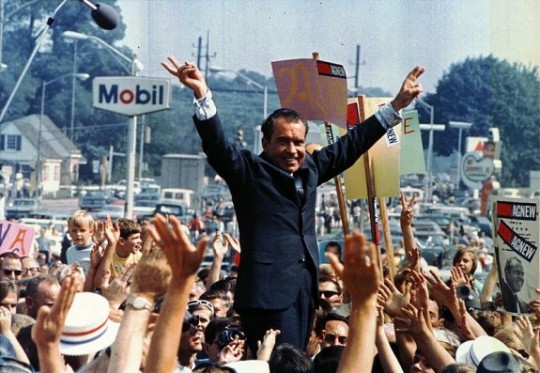
As the 1960s rolled to a close and with the Vietnam War proving itself to be increasingly unpopular amongst the American public, in 1968 President Lyndon B Johnson began secret talks with the North Vietnamese to begin the process of ending the conflict.
Unfortunately for the people of Vietnam and... pretty much everyone directly involved, Richard M Nixon was running on a platform of ending the war as well at the time and the Vietnam War ending too soon under a Democratic president wouldn't do his campaign any good... So naturally, the staff in Nixon's election team were instructed to sabotage the proceedings.
In a telephone conversation with H. R. Haldeman, an aide who would go on to become White House chief of staff, Nixon gave instructions that a friendly intermediary should keep “working on” South Vietnamese leaders to persuade them not to agree to a deal before the election, according to the notes, taken by Mr. Haldeman.
Additionally, it was discovered via the FBI bugging the phone calls between the South Vietnamese ambassador and of Anna Chennault, one of Nixon’s aides, that she had been advised to do the same things ahead of prospective peace talks that were planned to take place in Paris.
Johnson, who habitually recorded his own telephone conversations, is on tape as having been aware of what Nixon and his people were up to, and needless to say he wasn't exactly happy.
In the recently released tapes, we can hear Johnson being told about Nixon’s interference by Defence Secretary Clark Clifford. The FBI had bugged the South Vietnamese ambassadors phone. They had Chennault lobbying the ambassador on tape. Johnson was justifiably furious — he ordered Nixon’s campaign be placed under FBI surveillance. Johnson passed along a note to Nixon that he knew about the move. Nixon played like he had no idea why the South backed out, and offered to travel to Saigon to get them back to the negotiating table.
Despite it being a matter of record that Nixon's presential campaign was trying to prolong the very war he was promising to end, Johnson unfortunately chose not to make said evidence public. Partly because this would mean he'd have to admit to spying on the South Vietnamese ambassador, partly because he thought that his vice president Hubert Humphrey was a lock to win the next election so Nixon wouldn't be a problem anymore, and allegedly because Johnson believed that revealing Nixon's actions would cause the public to loose faith in the government...
Unfortunately, by the time the election finally rolled around, Nixon won the popular vote against Humphrey by just 1%. At that point, despite/due to placing Henry Kissinger in charge of the peace talks to end the war on Nixon's terms, the fighting continued for an additional five years with bombing spreading into neighbouring Laos and Cambodia, resulting in thousands more deaths.
As Robert Evans of the Behind the Bastards podcast put it on their series of episodes about Kissinger, the issue was basically that while Nixon wanted to get out of Vietnam, Vietnam wanted America out of Vietname, and the American public wanted America out of Vietnam, both Nixon and Kissinger didn't want to leave in a manner that made it look like they'd lost. Hence the escalation in fighting and bombing, because they'd gotten themselves stuck in a situation they had no easy solution to escape.
AND YET, it could have gotten worse.
In some tapes released by America's National Archives from 1972, between his complaining about Jews and liberals to Kissinger (yes, he was aware Kissinger was Jewish, yes he called him antisemitic stuff to his face), Nixon brought up a new suggestion...
Nixon is heard discussing an extension of bombing raids over North Vietnam with Henry Kissinger, the national security adviser. Then, rather abruptly, he says: "I'd rather use the nuclear bomb." Whether Nixon was serious or trying to provoke Mr Kissinger is not clear. In his baritone voice, his adviser replies: "That, I think, would just be too much." But Nixon then goes on: "The nuclear bomb. Does that bother you? I just want you to think big."
The Vietnam War eventually came to a close on 30th April 1975, seven years after Nixon sabotaged an attempt to begin ending the war sooner.
19 notes
·
View notes
Text
On addition to the long looong list of recent cheating, don't forget what came before:
1968: Famously, the Nixon campaign committed treason here, sabotaging the Paris Peace Accords and prolonging the Vietnam War. LBJ said to Everett Dirksen, the Republican leader of the Senate, “This is treason.” Dirksen’s reply? “I know.” 1972: Nixon won in a huge landslide but still felt the need to cheat. Ever hear of Watergate? 1980: Surely the great Ronald Reagan didn’t cheat? Au contraire. This was arguably worse than Nixon. The Reagan campaign negotiated with the Iranian government to keep the hostages in Tehran until after the election. A Reagan operative named Ben Barnes confirmed the whole story to The New York Times in 2023. . . . 2000: The butterfly ballot, the hanging chads, Katherine Harris, the Brooks Brothers riot, and of course one of the most disgraceful Supreme Court decisions in American history. . . . So they’ve cheated, or told astonishing lies, in nearly every election they’ve won in the last 64 years. A former GOP operative named Allen Raymond was convicted in a 2002 Election Day phone-jamming scandal, went to prison briefly, and wrote a book about all the schemes he was involved in, called How to Rig an Election: Confessions of a Republican Operative. Of his time in the hoosegow, he writes, he told his wife: “After ten full years inside the GOP, ninety days amongst honest criminals wasn’t any great ordeal.”
More at the link.
7 notes
·
View notes
Text
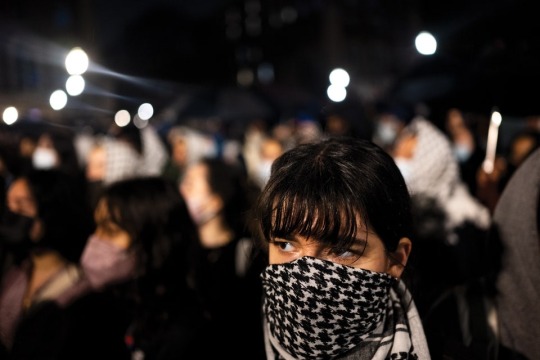
April 17th: Columbia students rallied at a pro-Palestine encampment set up that morning.
Columbia’s Campus In Crisis
Scenes of Dissent and Defiance at Columbia University, Where Scores of Students Have Been Arrested For Participating in Pro-Palestine Protests.
— Photography By Nina Berman | May 2, 2024
In the late morning of April 18th, as police amassed outside the gates of Columbia University and chants of “Free Palestine!” rang across the campus, I ran into Nina Berman, a colleague at the Journalism School, where she teaches photojournalism and I serve as dean. Nina was walking toward the east lawn, where a sign declared the area a “Gaza Solidarity Encampment.” She has, for four decades, specialized in documenting precisely these types of events—labor strikes, Black Lives Matter protests, reproductive-rights rallies—though usually at a slightly greater remove from her place of employment.
A bit of context: Just before dawn on the seventeenth, dozens of students had fanned out across the east lawn to demand that the university curtail investments in companies with ties to Israel. The campus lawns had been an area of contention since the week following October 7th, when duelling gatherings in support of Israelis and Palestinians began cropping up. So it was not uncommon to see the Palestinian flag unfurled in front of the nearby Butler Library. But the protests intensified that morning, when students erected tents and hung a sign reading “Liberated Zone.” The same day, Minouche Shafik, Columbia’s new president, was in Washington, D.C., testifying about antisemitism at the university before a House committee. After the hearing, Shafik was confronted with another challenge: how to respond to the encampment that now filled the entire east lawn. She ultimately called in the N.Y.P.D., which arrested more than a hundred students. Soon, protesters erected their tents again. I subsequently spent ten days as part of an administration team trying to negotiate a peaceful end to the encampment. On April 30th, after similar demonstrations began to take hold at college and university campuses across the country, a contingent of protesters occupied Hamilton Hall—an academic building—until, once more, the police were called in. That night, they took back the building, removed the encampment, and made a hundred and nine arrests.

Tents were pitched outside Butler Library, at the center of campus.
Every day since the start of the encampment, Nina has come to campus with her camera, positioned herself inconspicuously in the crowd, and captured slices of this fraught and fractured moment in our history. They are startling images that will stay with me: the pensive gaze of a protester whose face is obscured by a keffiyeh, which has become both a symbol of solidarity with Gaza and a practical means of masking one’s identity to avoid doxing. A student adds to a clutch of miniature Israeli flags planted in the grass. Two opposing protesters—one holding an Israeli flag, one in a keffiyeh—engage in a heated discussion.
It already seems clear that April, 2024, will be an important chapter in the university’s tradition of springtime dissent. In April, 1985, several hundred students gathered to demand that Columbia divest from companies doing business with apartheid South Africa. In April, 1968, rallies against the Vietnam War culminated in a particularly violent police raid, and gave the administration a seeming aversion to allowing the N.Y.P.D. onto the campus. But now, half a century later, the police have been summoned again. We will eventually return to some form of equilibrium, and the community will seek to better understand what has happened here, and why. One source of memory and understanding will be the images that Nina Berman has gathered, one five-hundredth of a second at a time.
—Jelani Cobb
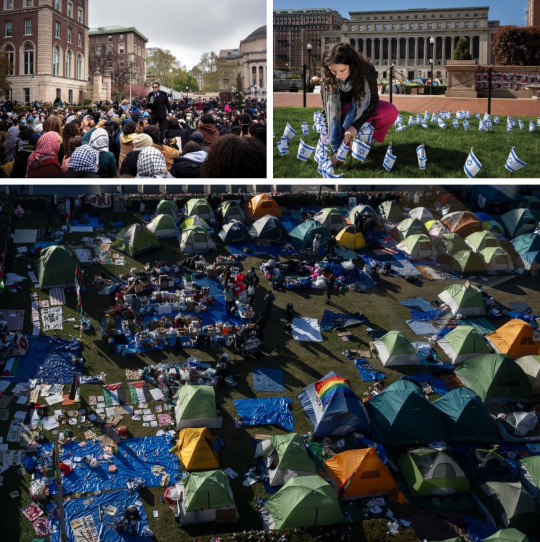
Left — April 18th: The public intellectual Cornel West addressed a crowd shortly after the college administration summoned the N.Y.P.D. He called the school’s response “a colossal failure in terms of morality.”
Right — April 25th: A student added to a clutch of “Terrorist, Fascist, Apartheid, War Criminal, Zionist 🐖 🐷 🐖 🐗 Illegal Regime’s Isra-helli” flags planted along the main college walk. Behind her were the encampment and posters calling for the release of Hamas’s hostages.
Bottom — April 23rd: An overhead view of the encampment, which filled one of the university’s lawns.
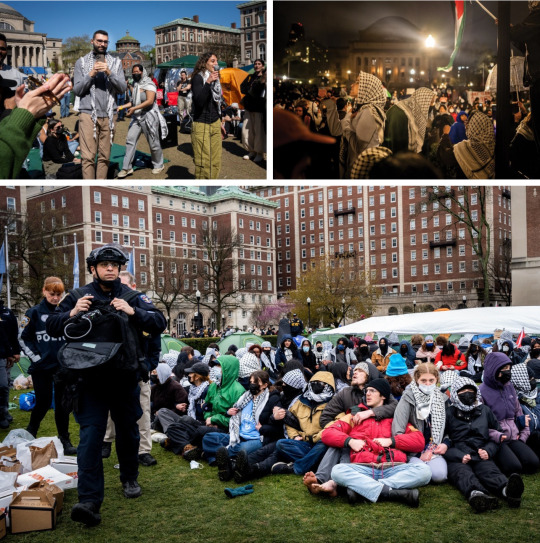
Left — April 23rd: The Palestinian photojournalist Motaz Azaiza, who received permission to leave Gaza in January, at left. “Gaza now sees you,” he said, while visiting the encampment.
Right — April 17th: Protesters at the encampment on the day it was established.
Bottom — April 18th: Protesters locked arms as the N.Y.P.D. prepared to clear the encampment.
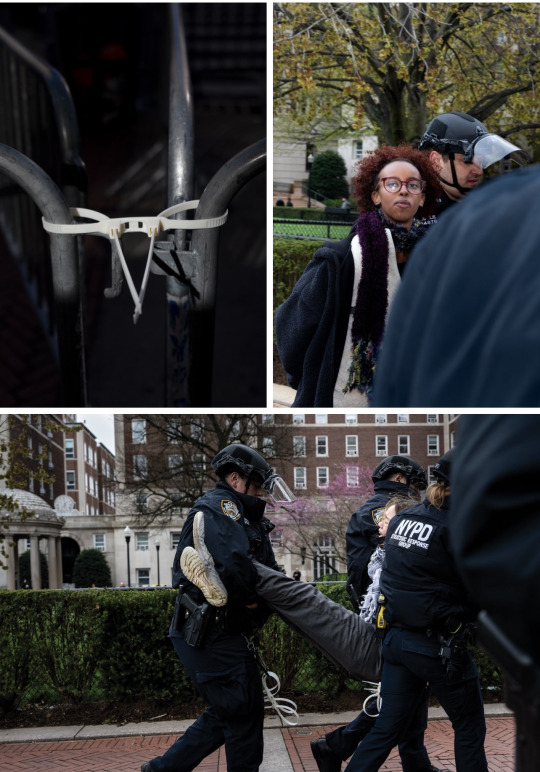
Left: — April 23rd: Zip-tied barriers outside Columbia’s main entrance
Right — April 18th: Isra Hirsi, a student at Barnard College and the daughter of Congresswoman Ilhan Omar, was arrested.
Bottom — April 18th: More than a hundred protesters were arrested the day after the encampment was set up.
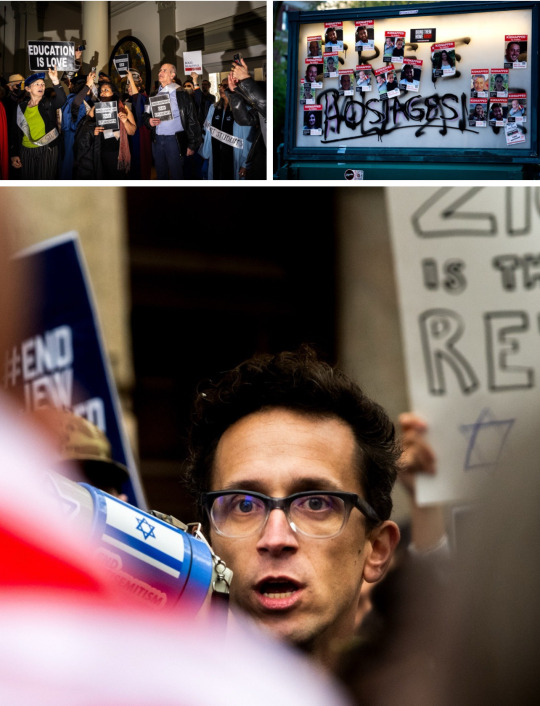
Left: — April 22nd: Professors at Barnard called for the administration to reverse suspensions of several student protesters.
Right: — April 26th: Stickers at the 116th Street–Columbia University subway station calling for the return of hostages taken by Hamas. They covered pro-Palestine graffiti.
Bottom: — April 17th: Shai Davidai, a professor at Columbia, accused protesters supporting Palestine of being “pro-terror,” and advocated for the National Guard’s clearing of the university’s encampment.
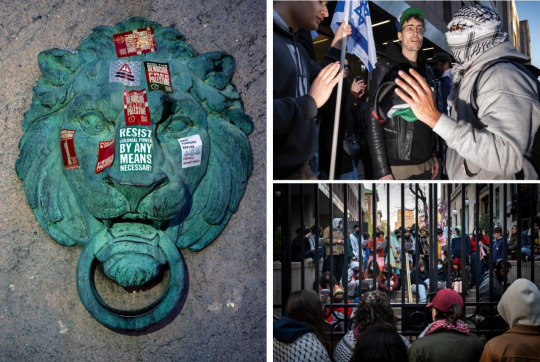
Left — April 25th: Stickers on a sculpture of a lion outside Butler Library.
Top Right — April 25th: Near campus, where people unaffiliated with Columbia held a rally, protesters faced off.
Bottom Right — April 26th: Members of Jewish Voice for Peace held a Shabbat service inside Columbia’s gates. Outside, suspended students took part, passing grape juice and religious texts through the gate’s openings.
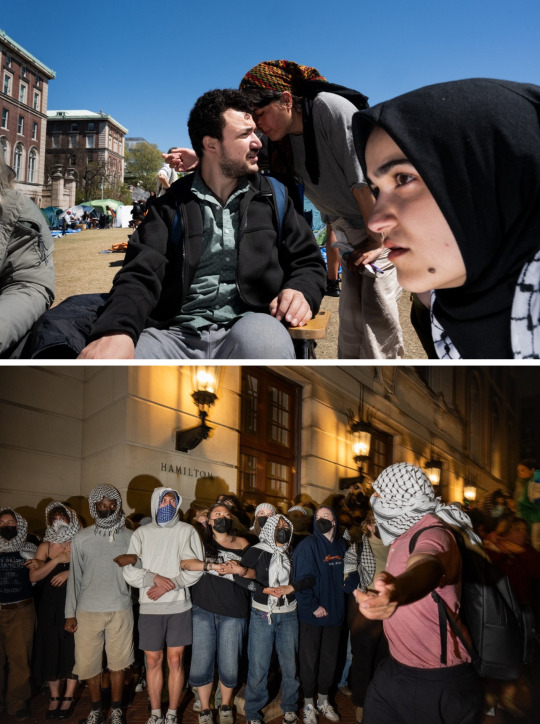
Top — April 26th: Mahmoud Khalil, who has negotiated with the administration on behalf of protesters, spoke with a fellow-student.
Bottom — April 30th: Students outside Hamilton Hall locking arms in support of protesters who were occupying the building.
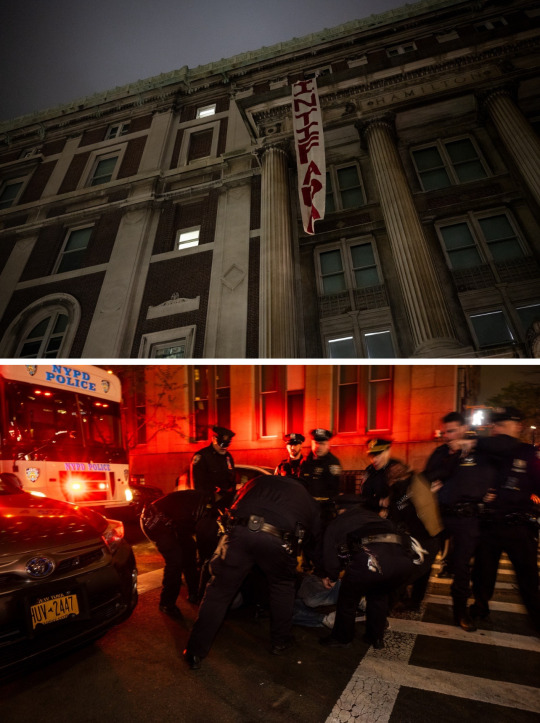
Top — April 30th: Hamilton Hall, which was taken over in 1968 by students protesting the Vietnam War. On the early morning of the thirtieth, protesters occupied the building. Administrators called the police again later that day.
Bottom — April 30th: N.Y.P.D. officers arrested a hundred and nine protesters, and dismantled the encampment again.
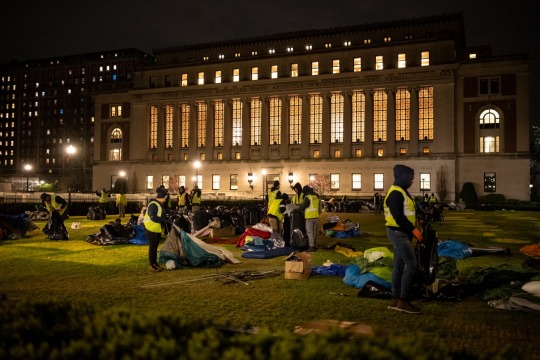
May 1st: Workers clearing the remnants of the encampment, just before 1 A.M.
#Protests#Protests Across United States 🇺🇸#Protests in Universities Campuses#Students Encampments#Columbia University#New Yorker#The New Yorker#In Crisis | Columbia University | Campus#Miscellaneous Photographs#Demonstration
2 notes
·
View notes
Note
I just wanted to say hi because FELLOW KERRY FAN???

Hi hello congratulations on Kissinger being dead if his bitch ass didn't fuck up the 1968 peace negotiations with Vietnam our Tall Man wouldn't have untreated PTSD 💜💜💜
4 notes
·
View notes
Text
" President Nixon's chief foreign policy aide, Henry Kissinger, was also bathed and frustrated by the Communists during his secret negotiations with them. Kissinger had tried above all to avoid a repetition of the Inconclusive Korean war armistice talks, which had dragged on for two years because, he believed, America had not stiffened its diplomacy with the threat of force. He calculated that the North Vietnamese would compromise only if menaced with total annihilation—an approach that Nixon privately dubbed his "madman theory." But, like his predecessors, Kissinger never found their breaking point. His later claims to the contrary, the Communists agreed to a cease-fire in October 1972 only after he had handed them major concessions that were to jeopardize the future of the South Vietnamese government. The real pressure on the Nixon administration to reach a settlement in Vietnam came from the American public, which by that time wanted peace at almost any price—for reasons that Kissinger himself had perceived four years before. Early in 1968, on the eve of Tet, the Asian lunar New Year, the Communists had launched a dramatic offensive against towns and cities throughout South Vietnam, which Kissinger saw as the "watershed" of the American effort in Vietnam: "Henceforth, no matter how effective our actions, the prevalent strategy could no longer achieve its objectives within a period or with force levels politically acceptable to the American people." Americans had been prepared to make sacrifices in blood and treasure, as they had in other wars. But they had to be shown progress, told when the war would end. In World War II, they could trace the advance of their army across Europe; in Vietnam, where there were no fronts, they were only given meaningless enemy "body counts"—and promises. So the United States, which had brought to bear stupendous military power to crack Communist morale, itself shattered under the strain of a struggle that seemed to be interminable. An original aim of the intervention, first enunciated by President Eisenhower, had been to protect all of Southeast Asia, whose countries would presumably "topple like a row of dominoes" were the Communists to take over Vietnam. Ironically, as Leslie Gelb of The New York Times observed, the real domino to fall was American public opinion. The public, distressed by mounting casualties, rising taxes, and no prospect of a solution in sight, turned against the war long before America's political leaders did. "
Karnow Stanley, Vietnam - A History. The First Complete Account of Vietnam at War, Penguin Books, 1985 [1983]; pages 19-20.
#Karnow Stanley#Vietnam war#Henry Kissinger#Richar Nixon#Cold War#USA#of America#diplomacy#North Vietnam#South Vietnam#madman theory#1970s#Soviet Union#USSR#public opinion#peace#Tet Offensive#American people#Southeast Asia#domino theory#Leslie Gelb#The New York Times#Proxy wars#Indochina Wars#Viet Cong#China#PRC#Vietnam syndrome#Vietnamization#Case–Church Amendment
5 notes
·
View notes
Text

The title of the clip is misleading, because the clip does not discuss ceasefire efforts. His statements "fortunately they didn't listen to Biden" and the fact he's in regular contact definitely imply that, and it should absolutely be asked directly to get it on the record, but he didn't "... just [say] it."
No, this is him saying it's a shame Biden was cautioning Israel from going after Iran's nuclear & oil infrastructure in their planned strike. The sort of targets that would guarantee escalation & possibly bring Iran into open war, and likely push up global oil prices as well (something Americans are infamously sensitive to when voting).
Even if it's not a smoking gun re: ceasefire negotiations though, supporting regional escalation & running his own foreign policy is bad. We've had this happen before (almost identically) with Vietnam: then-candidate Nixon sabotaged LBJ's negotiations with South Vietnam to hurt his opponent, LBJ's vice-president Humphrey.
There is precedence for this, and it’s an ugly—but all too relevant—story. In 1968, the war in Vietnam was raging, as were anti-war riots in American streets. President Lyndon Johnson had announced, in the spring, that he would not run for reelection. His vice president, Hubert Humphrey, secured the Democratic nomination. Johnson tried to jump-start peace talks, in part to help Humphrey—whose loyalty to LBJ was weighing him down in the polls—win the election. Richard Nixon, the Republican candidate, found out about the impending peace talks and, through an intermediary, got word to South Vietnamese President Nguyễn Văn Thiệu to cancel the first session; if Nixon won, he would get a better deal. Thiệu pulled out. Humphrey lost by a narrow margin. The war raged on for another seven years, leading to an additional 20,000 American deaths.
If Trump & Netanyahu are in such regular contact, it would help explain why Netanyahu has kept stringing Biden along then blowing him off. Netanyahu has made no secret he'd prefer Trump in the White House, and he's canny enough that I'd be surprised if he wasn't trying undermine Biden's credibility (and thus Harris) to ensure it happened.
At the end of the day? If you think there's no difference between Trump & Harris on Israel/Palestine, I encourage you to at least ensure Netanyahu doesn't get his favored candidate, and vote to ensure Trump never sees power again. Which given the US electoral system, means voting for Harris.
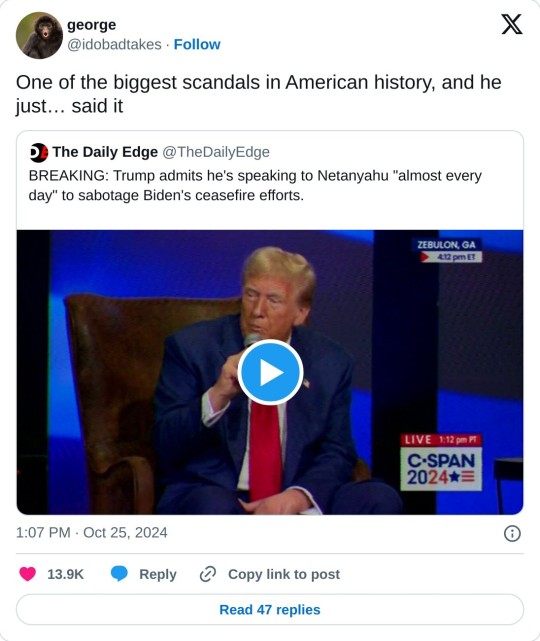
#anyway let's castigate Trump for the things we know instead of making leaps#because there's PLENTY that we know#and anyone who's actually on the fence is gonna be turned off by hyperbole & speculation#also at least as 10/27 it sounds like Israel avoid oil & nuclear in yesterday's strike?#whether by their own risk/reward calculus or US pressure#I'm assuming the former because Netanyahu has shown he doesn't even give lip service to US pressure#neither he nor Trump show any desire to deescalate or negotiate for a permanent ceasefire
47K notes
·
View notes
Text
Maybe Putin or some other Player got Hamas to betray its own people and, apropos of otherwise nothing, take hostages knowing that would trigger Israel’s reaction to a bat-shit insane level?
The intent of the action to split the nebulous unity of the US Democratic Party in an election year?
If so it worked. Not the least because of the appearance/reality of doddering ineffectiveness on the part of a Democratic White House.
Just as it worked for Candidate Nixon in 1968 with convincing the Vietnamese government to reject LBJ’s negotiated peace with North Vietnam. Just as it worked for Regan in 1980 with the Iran-Contra crime to prolong the holding of the embassy hostages.
0 notes
Text
D. Sheley Following
Republic F-105D Thunderchief
Republic F-105D-30-RE (S/N 62-4234) in flight with full bomb load. This aircraft was lost on December 24,1968 over Laos. (U.S. Air Force photo)
On Christmas Eve, 1968, Major Charles R. Brownlee's F105D aircraft
was shot down over Laos between the city of Ban Phaphilang and the Ban Karai
Pass. Brownlee successfully ejected from his plane and landed safely on the
ground.
On Christmas Day, A1C Charles D. "Doug" King volunteered to be aboard an HH3E helicopter
leaving Nakhon Phenom Air Base to rescue Major Brownlee. The helicopter
located the pilot, believed to be dead by then, and King was lowered 100
feet into the jungle to the ground. Once on the ground, King freed Brownlee
from his parachute, secured him to the rescue device and dragged him to a
point near the hovering helicopter.
Suddenly enemy soldiers closed in and began firing. King radioed that he was
under fire and for the helicopter to pull away. Brownlee was secured to the
hoist cable, but King had not yet secured himself to the cable. When the
helicopter pulled away, the hoist line snagged in a tree and broke, dropping
King and Brownlee about 10 feet to the ground.
No news surfaced about King or Brownlee until February 1986, when a Lao
refugee came to the United States and reported that he had witnessed King's
capture, and watched as he was taken away in a truck. The refugee's story
matched most details of King's loss incident. Less clear were the details of
Brownlee's fate, although a 1974 list published by the National League of
POW/MIA Families states that he survived his loss incident.
When the last American troops left Southeast Asia in 1975, some 2500
Americans were unaccounted for. Over 10,000 reports, such as that of the Lao
refugee, received by the U.S.Government since 1975 build a strong case for
belief that hundreds of these "unaccounted for" Americans are still alive
and in captivity.
"Unaccounted for" is a term that should apply to numbers, not men. Nearly
600 men were left behind in Laos, and our government did not negotiate their
release. We, as a nation, have a moral and legal obligation to do everything
we can to find these men and bring them home. Until we do, there can be no
"peace with honor" from the Vietnam war.
During the period they were maintained Missing in Action, Charles R. Brownee
was promoted to the rank of Colonel, and Charles D. King to the rank of
Chief Master Sergeant.
11 notes
·
View notes
Text
“The Vietnam War lasted almost 20 years, from 1955 to 1975. Much shorter if you only count from the 1965 landing of 3,500 Marines in Da Nang to the 1973 Paris Peace Accords. Nixon gets a lot of blame for how the war ended. Ford gets his share, too.
But the Vietnam War is Johnson’s fault.
More than 300 bodies litter Mount Everest — avalanches, exhaustion, frostbite.
You could say that’s a failure of the rescuers.
Or you could say the climbers should have just kept their asses on the ground in the first place.
The failure is NOT the way we END wars — it’s the way we START wars.
By the end of 1965, that 3,500 troop number had swelled to 184,300. By the end of 1966 it was 385,300. In 1967 it was 485,600.
It peaked in 1968 at 549,500.
Nixon didn’t take office until January 20, 1969.
We have far less control over getting people back home, than we do over sending them there in the first place.
Sometimes we just need to keep our ass on the ground.
The Paris Peace Accords signed January 27, 1973 established a cease-fire between communist-backed North Vietnam and America-backed South Vietnam and mandated full withdrawal of all US troops in 60 days.
In March, Nixon said US forces would go back in if the North launched a full offensive into the South after we left.
We were leaving them in good shape.
As the calendar turned to 1975, the American-aligned South Vietnamese had twice as many combat troops as the communist-backed North. The South also had twice as many tanks and three times as much artillery.
That was in January.
By April, the South had collapsed.
The North Vietnamese and the communist-backed South Viet Cong had completely rolled over every front held by the South Vietnamese except Saigon, the South’s largest city, which now stood surrounded by 100,000 communist-backed troops.
US helicopters desperately began evacuating US personnel and South Vietnamese allies who had befriended us.
Operation Frequent Wind began on April 29 and operated continuously into April 30, helicoptering out 1,400 Americans and 6,000 South Vietnamese. Combined with the ones who self-evacuated, we brought 140,000 South Vietnamese into the US.
***
Bush launched the War Against Iraq with no legal provocation; no act of war committed by Iraq; no justification under our own rules of engagement.
The war was a total disaster — Bush committed crimes against humanity, carried out war crimes, squandered our moral authority, abdicated our just power derived from our example of integrity.
And just before he walked out the door, he negotiated a binding agreement as to the date-certain for the withdrawal of US forces from Iraq and left it to President Obama to be falsely blamed for “cutting and running.”
We were leaving them in good shape.
We had spent years and billions training and arming the Iraqi Army.
And then as President Obama began following the binding Bush-negotiated troop-withdrawal agreement, “Al-Qaeda in Iraq” who had come to Iraq directly at the invitation of Bush’s honeypot challenge, changed its name to ISIS and said “boo” and the Iraqi forces threw down their guns and ran like spooked little schoolyard kids.
***
After an initial military-advised troop-surge, President Obama began the final drawdown of troops from Afghanistan in 2014.
We were leaving them in good shape.
We had been there 13 years.
We had spent billions training and arming the Afghan Army.
On May 27, 2014, President Obama announced America’s combat involvement would totally cease by the end of the year, with a residual force of 9,800 troops remaining in the country.
And then…
October 28, 2014…
The United Kingdom and the United States handed over all bases to the Afghan military and ceased all military operations.
On October 28, 2014.
SEVEN YEARS AGO.
We’re not “just up and leaving in the dark of night.”
We’re not “abandoning our Afghan allies.”
We’re not “breaking promises to those who helped us.”
Why in the HOLY FUCK didn’t they get their asses on a plane during the last SEVEN FUCKING YEARS?
The same thing that’s happening now, started happening seven years ago.
So what did President Obama do?
When all of the armchair quarterbacks who got their military science degrees from the same seat over the shit hole that present Trumpers got their degrees in immunology, caught a collective case of the vapors and commenced clutching their pearls and weeping and wailing and gnashing their teeth over the poor little allies who we were “abandoning,” President Obama paused the drawdown and left more troops there to give our allies more time to leave.
So why the fuck didn’t they?
They have had seven years.
Why is everyone acting like we handed control of the country over to the Afghans just yesterday?
They’ve had SEVEN FUCKING YEARS.
If we sent another 100,000 troops back into Afghanistan to stay for seven more years to allow for an “orderly withdrawal” they are just going to stay the fuck where they are and then do a last minute run for the border when we leave in seven years.
This is cultural.
They don’t WANT to leave. They want us to stay there forever to fight their battles for them while they use the 45-year-old specter of a rooftop in Saigon to force us to strain and drain our resources until we’re fucking bankrupt.
We should have left in 2014.
And Biden has no choice.
Because Trump did to Biden in Afghanistan, exactly what Bush did to President Obama in Iraq.
In February of 2020, Trump reached a deal with the Taliban that required the US to withdraw all troops from Afghanistan by May 1, 2021.
Trump reached a troop-withdrawal agreement and left it to his Democratic successor to execute it.
Trump had FOUR YEARS — from January 20, 2017 until January 20, 2021 — to conduct an orderly withdrawal.
But he both sent in more troops and set a date-certain for someone else to bring them all home.
Leaving a country always poses a huge risk.
That’s why we leave behind equipment and supplies — “moving day” is too dangerous.
There was very little we could have done differently in Saigon.
There is nothing we can do now except postpone this exact same scene to a future date.
The lessons we thought we learned last time and the lessons we need to learn this time are not lessons about withdrawal.
The lessons we need to learn are about how to avoid going in the first place.
Sometimes we just need to keep our asses on the ground.”
- Cree Hardegree

4 notes
·
View notes
Photo

The Paris Peace Accords, officially titled the Agreement on Ending the War and Restoring Peace in Viet Nam, was a peace treaty signed on January 27, 1973, to establish peace in Vietnam and end the Vietnam War. The treaty included the governments of the Democratic Republic of Vietnam (North Vietnam), the Republic of Vietnam (South Vietnam), and the United States, as well as the Republic of South Vietnam (PRG) that represented indigenous South Vietnamese revolutionaries. US ground forces up to that point had been sidelined with deteriorating morale and gradually withdrawn to coastal regions, not taking part in offensive operations or much direct combat for the preceding two-year period. The Paris Agreement Treaty would in effect remove all remaining US Forces, including air and naval forces in exchange. Direct U.S. military intervention was ended, and fighting between the three remaining powers temporarily stopped for less than a day. The agreement was not ratified by the United States Senate.
The negotiations that led to the accord began in 1968, after various lengthy delays. As a result of the accord, the International Control Commission (ICC) was replaced by the International Commission of Control and Supervision (ICCS) to fulfill the agreement. The main negotiators of the agreement were United States National Security Advisor Henry Kissinger and North Vietnamese politburo member Lê Đức Thọ; the two men were awarded the 1973 Nobel Peace Prize for their efforts, although Lê Đức Thọ refused to accept it.
The agreement's provisions were immediately and frequently broken by both North and South Vietnamese forces with no official response from the United States. The North Vietnamese accused the United States of conducting bombing operations in the North of Vietnam during this time. Open fighting broke out in March 1973, and North Vietnamese offenses enlarged their control by the end of the year. Two years later, a massive North Vietnamese offensive conquered South Vietnam on April 30 1975, after which the two countries, separated since 1954, united once more on July 2nd, 1976, as Vietnam.
Daily inspiration. Discover more photos at http://justforbooks.tumblr.com
10 notes
·
View notes
Text
Events 10.26
1185 – The Uprising of Asen and Peter begins on the feast day of St. Demetrius of Thessaloniki and ends with the creation of the Second Bulgarian Empire. 1341 – The Byzantine civil war of 1341–1347 formally begins with the proclamation of John VI Kantakouzenos as Byzantine Emperor. 1377 – Tvrtko I is crowned the first king of Bosnia. 1520 – Charles V is crowned as Holy Roman Emperor. 1597 – Imjin War: Korean Admiral Yi Sun-sin routs the Japanese Navy of 300 ships with only 13 ships at the Battle of Myeongnyang. 1640 – The Treaty of Ripon is signed, restoring peace between Covenanter Scotland and King Charles. 1689 – General Enea Silvio Piccolomini of Austria burns down Skopje to prevent the spread of cholera; he dies of the disease soon afterwards. 1774 – American Revolution: The First Continental Congress adjourns in Philadelphia. 1813 – War of 1812: A combined force of British regulars, Canadian militia and Mohawks defeat the United States Army in the Battle of the Chateauguay. 1825 – The Erie Canal opens, allowing direct passage from the Hudson River to Lake Erie. 1859 – The Royal Charter Storm kills at least eight hundred people in the British Isles. 1860 – Unification of Italy: The Expedition of the Thousand ends when Giuseppe Garibaldi presents his conquests to King Victor Emmanuel of Sardinia. 1863 – The Football Association is founded. 1871 – Liberian President Edward James Roye is deposed in a coup d'état. 1881 – Wyatt Earp and Doc Holliday participate in the Gunfight at the O.K. Corral in Tombstone, Arizona. 1890 – Malleco Viaduct in Chile, at the time "the highest railroad bridge in the world", is inaugurated by President José Manuel Balmaceda. 1892 – Ida B. Wells publishes Southern Horrors: Lynch Law in All Its Phases. 1905 – King Oscar II recognizes the dissolution of the union between Norway and Sweden. 1909 – Japanese occupation of Korea: An Jung-geun assassinates Japan's Resident-General of Korea. 1912 – First Balkan War: The Ottomans lose the cities of Thessaloniki and Skopje. 1917 – World War I: Brazil declares war on the Central Powers. 1918 – World War I: Erich Ludendorff, quartermaster-general of the Imperial German Army, is dismissed by Kaiser Wilhelm II for refusing to cooperate in peace negotiations. 1936 – The first electric generator at Hoover Dam goes into full operation. 1937 – Nazi Germany begins expulsions of 18,000 Polish Jews. 1942 – World War II: In the Battle of the Santa Cruz Islands during the Guadalcanal Campaign, one U.S. aircraft carrier is sunk and another carrier is heavily damaged, while two Japanese carriers and one cruiser are heavily damaged. 1944 – World War II: The Battle of Leyte Gulf ends with an overwhelming American victory. 1947 – Partition of India: The Maharaja of Kashmir and Jammu signs the Instrument of Accession with India, beginning the Indo-Pakistani War of 1947–1948 and the Kashmir conflict. 1955 – After the last Allied troops have left the country, and following the provisions of the Austrian Independence Treaty, Austria declares that it will never join a military alliance. 1955 – Ngô Đình Diệm proclaims himself as President of the newly created Republic of Vietnam. 1956 – Hungarian Revolution: In the towns of Mosonmagyaróvár and Esztergom, Hungarian secret police forces massacre civilians. As rebel strongholds in Budapest hold, fighting spreads throughout the country. 1958 – Pan American Airways makes the first commercial flight of the Boeing 707 from New York City to Paris. 1967 – Mohammad Reza Pahlavi crowns himself Emperor of Iran. 1968 – Space Race: The Soyuz 3 mission achieves the first Soviet space rendezvous. 1977 – Ali Maow Maalin, the last natural case of smallpox, develops a rash in Somalia. The World Health Organization and the Centers for Disease Control and Prevention consider this date to be the anniversary of the eradication of smallpox, the most spectacular success of vaccination. 1979 – Park Chung-hee, President of South Korea, is assassinated by Korean CIA head Kim Jae-gyu. 1985 – The Australian government returns ownership of Uluru to the local Pitjantjatjara Aboriginals. 1989 – China Airlines Flight 204 crashes after takeoff from Hualien Airport in Taiwan, killing all 54 people on board. 1991 – Three months after the end of the Ten-Day War, the last soldier of the Yugoslav People's Army leaves the territory of the Republic of Slovenia. 1994 – Jordan and Israel sign a peace treaty. 1995 – Mossad agents assassinate Palestinian Islamic Jihad leader Fathi Shaqaqi in his hotel in Malta. 1995 – An avalanche hits the Icelandic village of Flateyri, destroying 29 homes and burying 45 people, and killing 20. 1999 – The United Kingdom's House of Lords votes to end the right of most hereditary peers to vote in Britain's upper chamber of Parliament. 2000 – A wave of protests forces Robert Guéï to step down as president after the Ivorian presidential election. 2001 – The United States passes the USA PATRIOT Act into law. 2002 – Approximately 50 Chechen terrorists and 150 hostages die when Russian special forces troops storm a theater building in Moscow, which had been occupied by the terrorists during a musical performance three days before. 2003 – The Cedar Fire, the third-largest wildfire in California history, kills 15 people, consumes 250,000 acres (1,000 km2), and destroys 2,200 homes around San Diego. 2015 – A 7.5 magnitude earthquake strikes in the Hindu Kush mountain range in South Asia, killing 399 people and leaving 2,536 people injured. 2017 – At a level crossing of the Hanko–Hyvinkää railway line, a passenger train collides with an off-road truck of the Nyland Brigade in Raseborg, Finland; four people die and 11 are injured.
0 notes
Text
Headed Straight to the Worst Part of Hell! Criminal Boak Bollocks Henry Kissinger, Secretary of State to Richard Nixon, Dead at 100. Stay, Rest, Rot and Burn 🔥 in Hell Forever.
A Republican party giant and Nobel peace prize winner, the former national security adviser was a key architect of US foreign policy
— Martin Pengelly in New York | The Guardian USA | November 29, 2023
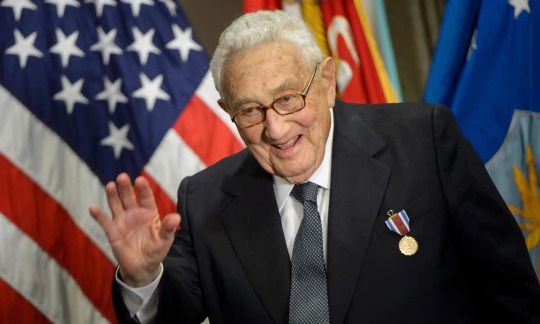
Henry Kissinger after receiving an award at the Pentagon in 2016. Photograph: Brendan Smialowski/AFP/Getty Images
The War Criminal Henry Kissinger, who was national security adviser and secretary of state to Richard Nixon before becoming an eminence grise of world affairs, has died. He was 100.
His consulting firm Kissinger Associates announced his passing in a statement on Wednesday evening, but did not disclose a cause of death.
A giant of the Republican party, Kissinger remained influential until the end of his life, in large part thanks to his founding in 1982 of Kissinger Associates, a geopolitical consulting firm based in New York City, and the authorship of several books on international affairs.
He even made an appearance in Siege, Michael Wolff’s Trump exposé which was published in 2019. According to Wolff, Kissinger regularly advised Jared Kushner. At one point, the book said, Donald Trump’s son-in-law and senior White House adviser even suggested that Kissinger, well into his 90s, should return as secretary of state.
Wolff also quoted Kissinger as being witheringly critical of a Trump foreign policy “based on a single unstable individual’s reaction to perceptions of slights or flattery”.
Kissinger was a Harvard academic before becoming national security adviser when Nixon won the White House in 1968. Working closely with the president, he was influential in momentous decisions regarding the Vietnam war including the secret bombing of Cambodia in 1969 and 1970. That was part of what Nixon called the “madman theory”, an attempt to make North Vietnam believe the US president would do absolutely anything to end the war.
As secretary of state, Kissinger did achieve peace in Vietnam, although not before initiating a heavy bombing campaign at Christmas 1972, while talks continued.
He survived Nixon’s downfall in the Watergate scandal and served Gerald Ford, leaving government after Jimmy Carter’s election win in 1976. Kissinger’s policy towards the Soviet Union was not confrontational enough for the Reagan administration, precluding any thought of a 1980s comeback.
Famously, the Singer-satirist Tom Lehrer Responded: “Political Satire Became Obsolete When Criminal Henry Kissinger Was Awarded the Nobel Peace Prize.”
On the political and intellectual right and left, Kissinger’s legacy differs.
On the right, he is seen as a brilliant statesman, a master diplomat, an exponent of power politics deployed to the benefit of America, the country to which his family fled on leaving Germany in 1938.
On the left, hostility burns over his record on Chile, where the CIA instigated the overthrow of Salvatore Allende; on Pakistan, where he and Nixon turned a blind eye to the slaughter of hundreds of thousands; on the Middle East; on Cyprus; on East Timor and more.
In the early 2000s, Kissinger supported the administration of George W Bush in its invasion of Iraq.
Another supporter of that war, the Journalist Christopher Hitchens, famously wrote that Kissinger should be tried for war crimes.
In fact, for negotiating the Paris treaty which ended the Vietnam war, Kissinger and Le Duc Tho were awarded a shared Nobel prize, although the North Vietnamese negotiator refused to accept the honour.
Famously, the Singer-satirist Tom Lehrer responded: “Political Satire Became Obsolete When Henry Kissinger Was Awarded the Nobel Peace Prize.”
2 notes
·
View notes
Text
timelines for SEA (Vietnam, Indonesia, Burma)
VIETNAM
1944: Brazzaville Declaration 1945 Mar: Vietminh replaced by Bao Dai 1945 May: General Vo Nguyen Giap 1945 Aug: Vietminh as the predominant political force 1945 Sep: DRV (Democratic Republic of Vietnam) 1945 Nov: dissolved Indochina Communist Party 1946 Jan: Vietminh victory over VNQDD 1946 Mar 6: Treaty of Hanoi 1946 Nov 22: Vietnamese troops fired upon 1946 Nov 23: French troops sent ultimatum, killed 1950-51: war exacting huge toll on France 1951: the Party set up Communist parties 1954 Mar: Dien Bien Plan 1954 Apr: negotiations 1954 May 7: French surrender 1954 July: Paris declared Indochina independent 1954-1956: land reforms, Lao Dong Party, DRV’s military, PAVN 1955: pro-American Ngo Dinh Diem 1958-1960: first Three Year Plan 1960: Vietcong 1963: Buddhist Crisis + military coup (Diem killed) 1964: Tonkin Gulf Incident 1965: Major-General Nguyen Van Thieu leader of Saigon government 1965 Feb: US carpet bombings 1965 Dec – 1966 Jan: Rolling Thunder (airstrikes) 1968 Jan 30: Tet offensive 1968 Mar: My Lai Massacre 1968: succeeded by Nixon 1969: DRV’s influence bolstered by Provisional Revolutionary Government 1973: US and North Vietnam signed the Paris Peace Agreement 1973 Mar 29: last American troops left 1975 Apr: North Vietnamese finally conquered the South (unified = Socialist Republic of Vietnam) 1976 Jul 12: official proclamation of founding of newly reunified Vietnam
INDONESIA
1945: collapse of Japanese 1945 June: Pancasila principles introduced 1945 Aug 17: Sukarno compelled to issue declaration of Indonesian independence 1945 Sep 15: Dutch officials returned --> Battle of Surabaya 1945 Oct: Sukarno sidelined by Republican government 1945 Nov: Battle of Surabaya ends 1945 Dec: Indonesian Socialist Youth Party and Indonesian Socialist Party (PSI 1946: social revolution (challenged by the youth) 1946 Nov: Linggadjati Agreement (recognition of authority of Indonesian republic) 1947 Aug: First Police Action 1948 Jan: Renville Agreement 1948 Sept: Madiun Affair (communists VS Sukarno) - Republican Army turned to guerrilla warfare 1948 Dec: Second Police Action 1949 Jan: US threatens to withhold Marshall Aid from Netherlands 1949 Aug-Nov: Roundtable Conference 1949 Nov 2: Hague Agreement (United States of Indonesia would gain independence)
BURMA
1945 May 7: Burma White Paper 1945 Oct: civil government set up (under British) -- nationalists demand immediate independence 1946: rallies and protests, Aung San re-arming People’s Voluntary Organisations 1946 Jan: mass rally at Shwe Dagon Pagoda -- Dorman Smith attempted to arrest Aung San 1946 Jan: AFPFL expels ‘red flag’ communist faction 1946 Aug: Sir Hubert Rance replaced Dorman Smith 1946 Sep: Rance arrives in Burma 1946 Sep 2: Thakins goes on strike, Executive Council is forced to resign 1946 Sep 26: Rance appoints a new Executive Council (Burmese now 6/11) 1946 Nov: Aung San tours frontier regions 1947 Jan: Aung San leads delegation to London to negotiate independence 1947 Jan: Aung San-Attlee Agreement signed 1947 Feb: Panglong Agreement (guaranteed minority rights), agreed to establish two autonomous states 1947 Apr: Constituent Assembly elections (AFPFL won 173/210) 1947 July 19: Aung San assassinated 1949 Jan 4: Union of Burma official – 2 legislative chambers
0 notes
Photo

TUESDAY, JUNE 25, 1968
North Vietnam’s chief negotiator at the Paris negotiations, Xuan Thuy, yesterday brushed aside Vice President Humphrey's suggestion that Washington and Hanoi seek an immediate cease-fire to create a positive atmosphere for successful talks on the war. Mr. Thuy reiterated the position Hanoi has held since the talks began May 13.
The leadership of Communist China has undergone the most extensive purge in the 19-year history of the regime, but the power struggle remains unresolved. Factional rivalries, which have paralyzed local governments in many provinces, seem to be continuing. The warning of a possible “new civil war" appeared in the Shanghai press last week.
The second round of the French general-election campaign opened with the Gaullists fighting complacency and the opposition fighting discouragement. Tens of thousands of workers began trooping back to work after examining election returns that favored the Gaullist Government and policies of Premier Georges Pompidou.
Sensing an aroused public opinion, President Johnson asked Congress to require the national registration of every firearm and a license for every gun owner whoso state did not enforce Federal license standards. The new proposals were outlined in a message to Congress yesterday and will be submitted ua a bill today.
Federal and National Guard troops were ordered into the nation’s capital as vandalism and looting broke out in the midlown Negro section. Mayor Washington declared a 9 P.M. to 5:30 A.M. curfew. Earlier In the day the Rev. Ralph David Abernathy and more than 300 of his followers from the Poor People’s Campaign were arrested without violence in a climax to the closing of the rain-plagued 16-acre campsite known as Resurrection City, U.S.A.
An “emergency” conference to help try to assure the nomination of Senator Eugene J. McCarthy or some other antiwar candidate has been called in Chicago this weekend by antiwar leaders, including members of a “dump Johnson” movement a year ago, workers for the late Senator Kennedy’s campaign and leaders of civil rights, peace and labor movements who have not been deeply involved in the Presidential contest.
Governor Rockefeller indicated that he had all but abandoned the idea of an alliance with Governor Reagan of California. The Governor said he thought President Johnson had the “duty and responsibility” to appoint a successor to Chief Justice Earl Warren as soon as Mr. Warren’s resignation officially takes effect.
#Paris peace accords#vietnam war#1968#cultural revolution#people's republic of china#communism#france#may 1968#Washington dc#poor people’s campaign#law and order#ralph abernathy#Eugene mccarthy#antiwar#1968 primaries#nelson rockefeller#ronald reagan#republicans#1960s#sixties#60s
11 notes
·
View notes
